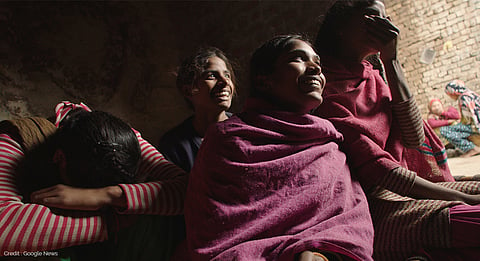
- Reviews
- Power List 2024
- Cannes 2024
- In-Depth Stories
- Web Stories
- News
- FC Lists
- Interviews
- Features
- FC SpecialsFC Specials

Director: Rayka Zehtabchi
Format: Short Documentary
Streaming on: Netflix
Period. End of Sentence. is saddled with the task of depicting eons of cultural conditioning and social awakening in just 24 minutes. As is the drawback with topics covered in this format, it looks like a neat highlights trailer that is designed to make our heads join the dots. Craft-wise, it is nothing remarkable, at least in context of the world it represents. But if social relevance is a part of filmmaking in narrative fiction, social relevance is filmmaking in narrative non-fiction.
By focusing on a cross-section of women from a remote North Indian village outside New Delhi, the documentary goes about chronicling the introduction and novelty of the sanitary pad system in rural surroundings. The film essentially tells the Akshay Kumar starrer Padman's story, but from the lens of those it should have been told: the women. You also see Arunachalam Muruganantham, the man who invented the low-cost pad machine, but only for a fleeting moment, as a result of which he isn't allowed to hijack the DNA of what the filmmakers want to convey.
So you have scarcely believable images – mostly reactions, tragic attitudes and wry observations – from four consecutive phases of the "underdog" lifecycle unfurling in the village: Ignorance, information, execution, redemption. It begins with the filmmakers examining the ignorance, feigned or otherwise, of the region's males and females. "Period? You mean when the school bell rings?" a young man asks, unable to make eye-contact with the camera, while a child in class struggles to maintain a straight face when asked about menstruation. The village elders call it "bad blood" and we see young housewives speaking about the discarded cloth they use to wipe the 'disease' away.
The tide changes with the appearance of Sneha, a strong-willed girl who wants to join the police force: an ambition she needs a job to fund. Enter social worker Shabana, who decides to recruit precisely these women to work in her small pad-machine factory. The older lady has a perpetually gentle smile on her face, one that camouflages a lofty dream; "the sky is the limit," she excitedly declares in a rare private moment. The film looks up, quirky music plays over shots of embarrassed men ("diapers?" they ask, proving that men continue to be terrible fakers…even on camera), and soon we see the girls on sales trips trying to promote their 'Fly' pads. We see them hoping to monetize their enlightenment, a portion that results in an endearing conflict between conscience and karma.
All of this usually makes for a long journey of transition. The editing feels strange because of how we aren't allowed to feel the passage of time (periods). Which is why it's perhaps just the snapshot of "change" rather than the feeling of it that tides over a film that might have deserved a wider gaze. I'm not sure that being nominated for an Oscar in the Short Documentary category might have done our perception of Period any favours. It is now impossible to view this as anything but a rare Indian co-production in the reckoning for the biggest movie prize in the world. On that account, this film is only midway through its sentence.